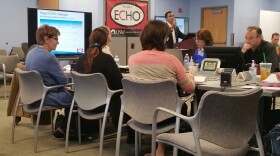The health care worker shortage in New Mexico hits rural areas particularly hard. That’s especially true for finding specialty care to manage chronic disease.
About 13% of New Mexicans have been diagnosed with diabetes, which is higher than the national average of about 12%.
Associate Director of Project ECHO Matt Bouchonville said because of the lack of endocrinologists in rural areas, diabetic patients are more likely to experience major complications and even death due to the disease.
ECHO recently wrapped up a study showing that training rural primary doctors by video conferencing helps them become more comfortable managing care. The goal of the study, or Endo ECHO, is to provide mentorship to primary physicians where they can present cases and patients to wider networks and specialists. This comes as therapies advance and guidelines become more complex.
“We saw that patients did better clinically, their diabetes control was improved just as well if not better than what we’re seeing in the specialist clinic,” said Bouchonville.
Bouchonville said diabetes complications are preventable with early and aggressive treatment. The study shows that this type of intervention empowers primary care providers and benefits patients.
“Patients treated by ECHO-trained primary care providers, they’re not being hospitalized as regularly, they're experiencing lower health care costs,” Bouchonville said.
He says the health care worker shortage poses challenges for treatment as these patients cannot wait several months to see a diabetes specialist. But the Endo ECHO model has found a way to work with this challenge.
“Because there are not enough diabetes specialists, the vast majority of people with diabetes in the U.S. are treated by primary care providers,” said Bouchonville.
Bouchonville said based on the successful study outcomes in New Mexico, and because there’s a workforce shortage across the country, ECHO is working with other states to develop this model of care.
This coverage is made possible by the W.K. Kellogg Foundation and KUNM listeners.







